How to Use Biochar in Your Garden: Boosting Soil Fertility and Plant Health
- February 28, 2024
- 7 comment
Biochar has the potential to enhance a wide variety of soils, thanks to its exceptional ability to adsorb and retain nutrients and water, preventing them from washing away while keeping them accessible to plants. This capability not only boosts the fertility of your soil but also helps in mitigating water erosion and the runoff of fertilizers. However, the method of utilizing and storing biochar effectively hinges on several factors, including the initial fertility level of your soil and your goals, such as whether you aim to employ biochar in crop cultivation.
List on How to Use Biochar in Your Garden
- Preparing Biochar for Garden Use
- Incorporating Biochar into Soil
- Biochar in Composting
- Benefits of Using Biochar
What is Biochar?
Biochar is a highly porous, carbon-rich material produced by the thermal decomposition of organic matter, such as plant materials and agricultural waste, in an oxygen-limited environment—a process known as pyrolysis. This process results in a stable form of carbon that can endure in soil for thousands of years. Biochar has a black, lightweight, and fine-grained structure with a vast surface area.
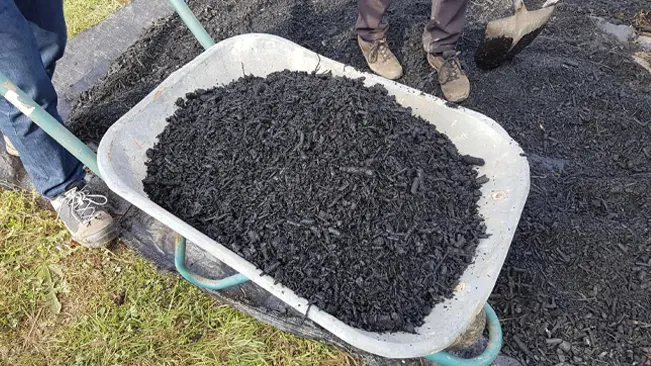
Its use in soil amendment is highly valued due to its ability to improve soil fertility, enhance plant growth, and retain soil moisture. Biochar’s structure creates an ideal habitat for beneficial soil microorganisms, which can lead to healthier plant-soil ecosystems. Additionally, biochar is recognized for its potential to sequester carbon, thereby contributing to the mitigation of climate change by reducing greenhouse gas emissions into the atmosphere. The benefits of biochar extend beyond enhancing soil health and agricultural productivity; it also plays a role in water filtration, reducing soil acidity, and detoxifying contaminated land by adsorbing toxins and heavy metals. The versatility and sustainability of biochar make it a significant component in regenerative agriculture practices and environmental conservation efforts.
How to Use Biochar
Preparing Biochar for Garden Use
Is essential for harnessing its full potential in garden applications, focusing on “charging” or “inoculating” the biochar to enrich it with beneficial microorganisms and nutrients. This crucial step ensures that the biochar, when added to the garden, does not deplete the soil of moisture and essential nutrients. The preparation process begins with moistening the biochar to ensure uniform dampness, preventing it from absorbing too much moisture from the soil, which could be detrimental to plant roots. Following this, the biochar is mixed with nutrient-rich materials like compost or worm castings, introducing a variety of microorganisms to the mix. For an additional microbial boost, the biochar can be inoculated with solutions teeming with beneficial microbes, such as compost tea, worm tea, or even diluted molasses, to enhance microbial activity within the biochar.
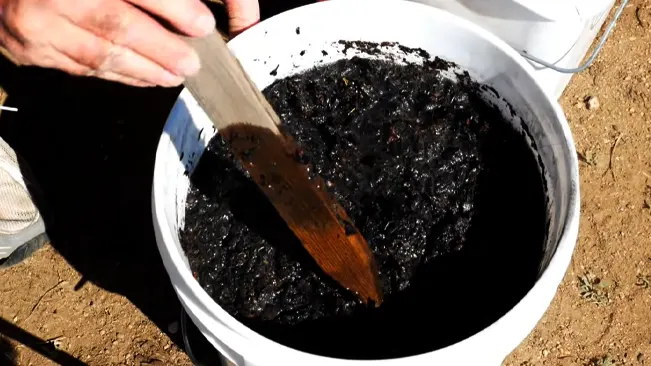
After the biochar is sufficiently enriched with nutrients and microorganisms, it’s crucial to allow the mixture to rest for a period ranging from a few days to a few weeks. This resting phase gives the biochar ample time to fully absorb the added nutrients and microorganisms, preparing it to immediately start improving soil health upon integration into the garden. This preparation process not only optimizes the biochar’s effectiveness in the soil but also ensures that it contributes positively to the garden ecosystem from the moment it is applied, fostering a thriving environment for plant growth.
Incorporating Biochar into Soil
Is a versatile process that can be adapted to both new and established garden beds to enhance soil health and plant growth. When creating new garden beds, integrating biochar into the soil from the outset can lay a strong foundation for plant development. This involves mixing biochar thoroughly within the soil, particularly focusing on the upper 6 to 12 inches where plant roots are most active, ensuring that the biochar is evenly distributed across different soil layers. This method allows the biochar to immediately begin interacting with the soil ecosystem, promoting moisture retention, nutrient availability, and microbial activity right from the start.
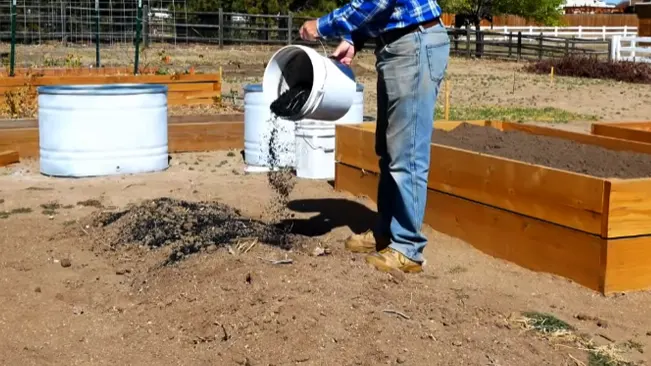
For gardeners working with established beds, biochar can still be effectively added by gently sprinkling it over the soil surface and then incorporating it into the top 6 inches of the soil. This can be conveniently done during routine planting activities or when refreshing the beds at the season’s change. Additionally, biochar can be used in a more targeted approach by adding a handful to the planting holes of individual plants, providing a direct boost to the root zone and immediately benefiting the newly planted flora. This tailored application ensures that each plant gets a concentrated dose of biochar’s benefits, promoting healthier growth and more resilient plants in the garden.
Biochar in Composting
Processes can significantly enhance the efficiency and quality of the compost produced. By layering biochar within the compost pile, interspersed with green (nitrogen-rich) and brown (carbon-rich) materials, biochar acts as a sponge, absorbing excess moisture and nutrients. This capacity not only helps in maintaining the optimal moisture balance within the compost pile but also minimizes potential leachate and unpleasant odors that can arise during decomposition. The porous nature of biochar provides an extensive surface area that traps these nutrients, preventing them from being washed away and instead making them available for microbial action within the compost.
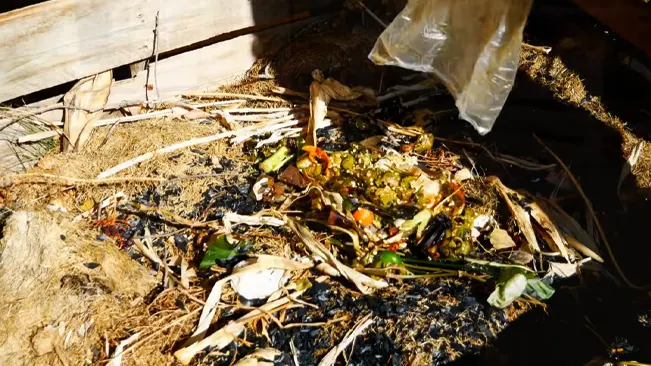
Biochar’s role in composting extends beyond moisture and nutrient management; it serves as an ideal habitat for beneficial microorganisms, fostering a rich microbial ecosystem within the compost pile. This enhanced microbial activity not only speeds up the composting process but also enriches the compost with a diverse range of nutrients and beneficial microbes. As the compost matures, the biochar becomes “charged” with these nutrients and microorganisms, turning the finished compost into a highly effective soil amendment. When this enriched compost is introduced to garden soil, it brings along the biochar, now teeming with life and nutrients, ready to significantly boost soil fertility and plant health.
The Best Place to Put Biochar
The ideal placement of biochar varies based on its intended use. For soil enhancement purposes, integrating biochar directly into the root zone the area immediately surrounding a plant’s roots is advisable. Mixing biochar into the top 4 to 6 inches of soil leverages its exceptional abilities to retain moisture, hold nutrients, and support beneficial soil microorganisms, ensuring that biochar remains stable and effective within the soil environment.
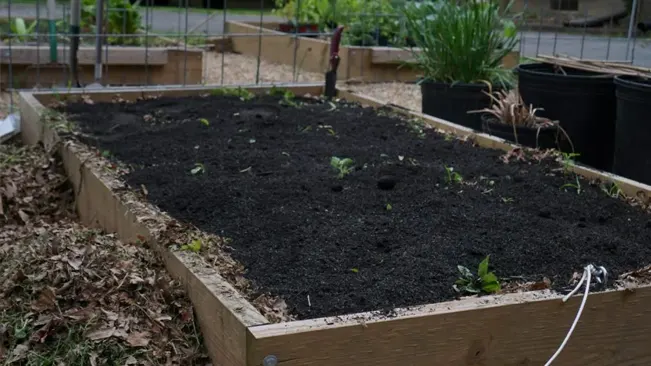
Conversely, when biochar is utilized for water purification, contaminant filtration, or erosion control, embedding it into the soil isn’t always necessary. In these scenarios, biochar is strategically positioned in specific areas to meet the unique requirements of each project, often contained within specialized devices like landscape socks or filtration units. For instance, biochar can be placed in areas prone to runoff from landscapes, buildings, roads, or polluted sites, including locations that are not directly in the soil.
Benefits of Using Biochar
- Enhanced Soil Fertility: Biochar improves soil fertility by retaining nutrients that would otherwise leach out of the soil, making them more available to plants. Its porous nature helps in holding onto nutrients like nitrogen, potassium, and phosphorus, which are essential for plant growth.
- Increased Water Retention: The porous structure of biochar enables soils to better retain water, reducing the need for frequent watering and helping plants withstand drought conditions. This can be particularly beneficial in arid regions or during dry spells.
- Soil Aeration and Structure: Biochar helps to improve soil structure, breaking up compacted soils and promoting better aeration. This enhances root growth and allows beneficial microorganisms to thrive, creating a healthier soil ecosystem.
- Carbon Sequestration: Biochar is a stable form of carbon, produced from organic matter, that can last in the soil for hundreds to thousands of years. By sequestering carbon in the soil, biochar helps mitigate climate change by reducing greenhouse gas concentrations in the atmosphere.
- Support for Soil Microorganisms: The complex structure of biochar provides a habitat for beneficial soil microorganisms. These microbes play a crucial role in soil health, aiding in nutrient cycling, decomposing organic matter, and improving plant health.
- Reduction of Soil Acidity: Biochar can help neutralize soil pH, reducing acidity and making soils more hospitable for a variety of plants. This can be particularly beneficial in areas with naturally acidic soils.
- Pollutant Remediation: Biochar has the ability to adsorb and retain soil pollutants such as heavy metals and pesticides, reducing their availability to plants and mitigating their impact on the environment.
- Improved Plant Health and Yield: The cumulative effect of biochar’s soil-enhancing properties can lead to healthier plants that are more resilient to diseases and pests, often resulting in increased crop yields and higher quality produce.
- Waste Reduction: Producing biochar from agricultural residues, wood waste, and other organic materials can reduce waste and provide a sustainable means of disposing of biomass that might otherwise contribute to environmental degradation.
Conclusion
In conclusion, biochar stands out as a multifaceted and sustainable solution that offers significant benefits for soil health, plant growth, and environmental conservation. Its unique properties, such as high porosity, nutrient retention, and ability to support beneficial soil microorganisms, make it an invaluable addition to gardening and agricultural practices. By enhancing soil fertility, improving water retention, and aiding in carbon sequestration, biochar addresses key challenges in sustainable agriculture and climate change mitigation. Furthermore, its role in remediating soil pollutants and reducing waste through the repurposing of biomass adds to its environmental appeal. Incorporating biochar into soil management practices can lead to healthier, more resilient plant ecosystems, increased crop yields, and a positive impact on the global carbon cycle. Embracing biochar is not only a step towards enhancing agricultural productivity but also a stride towards a more sustainable and environmentally conscious approach to land management and conservation.
FAQs
1. What is biochar?
Biochar is a carbon-rich, porous material made from the thermal decomposition of organic matter (such as wood, manure, or crop residues) in a process called pyrolysis, which occurs in the absence of oxygen.
2. How does biochar benefit the soil?
Biochar enhances soil fertility, improves water retention, supports beneficial microbial growth, improves soil structure, and helps neutralize soil pH. It also adsorbs and retains soil pollutants, reducing their availability to plants.
3. Can biochar help with climate change?
Yes, biochar can sequester carbon in the soil for hundreds to thousands of years, reducing the amount of CO2 in the atmosphere and thus helping to mitigate climate change.
4. How do you use biochar in the garden?
Biochar can be mixed into the soil when preparing new garden beds, added to existing beds by incorporating it into the topsoil, or used in compost piles to enhance the composting process and the quality of the finished compost.
5. Does biochar need to be “charged” before use?
Yes, it’s often recommended to “charge” biochar with nutrients and beneficial microbes by mixing it with compost, worm castings, or nutrient-rich solutions before adding it to the soil, to avoid nutrient depletion.
6. Is all biochar the same?
No, the properties of biochar can vary depending on the type of biomass used and the conditions of the pyrolysis process. Different biochars may have varying effects on soil and plant health.
7. Can biochar harm my plants?
When properly prepared and used, biochar is generally beneficial to plants. However, using uncharged biochar can temporarily deplete soil nutrients and moisture, potentially stressing plants.
8. How much biochar should I use in my garden?
Recommendations vary, but a general guideline is to mix a 5-10% biochar by volume into the soil. It’s best to start with a smaller amount and observe the effects before adding more.
9. How long does biochar last in the soil?
Biochar is a stable form of carbon that can remain in the soil for hundreds to thousands of years, continuously providing its benefits without needing to be reapplied.
10. Can I make biochar at home?
Yes, biochar can be made at home using various methods, such as small-scale pyrolysis in a kiln or retort. However, it’s important to follow safety guidelines and regulations due to the risks of fire and smoke.

Joel Cunningham
Forestry AuthorI'm Joel Cunningham, an expert in pruning and weed management with over a decade of experience. My skills are rooted in formal training and extensive practice, focusing on advanced pruning techniques and efficient weed control. I'm known for my quality work, precision, and deep understanding of plant health and soil dynamics. My contributions extend to educational initiatives where I share sustainable practices and advice, establishing myself as a reliable and authoritative figure in the gardening community.
7 comments
Very educating
Wilson Nderitu
March 3, 2024 7:37 pmWhere can buy Biochar in Kenya or any other Country what is its price and minimum pack. Rgrds Bweya
Bweya
March 3, 2024 4:10 amIt is a fine product to assist farmers how can we get in touched to the product or how can we prepare our own thanks
Peter obeng darko
March 5, 2024 2:58 pmYou can make your own biochar or buy from Safi Organics in Kenya.
Jim
March 4, 2024 9:12 amExcellent article and what the writer tells is very right because i am a farmer practicing of the above process which has given good results.













Am an field extension staff promoting biochar and I want to have a look knowledge about biochar.
Obby
March 6, 2024 4:23 pmAs a field extension staff promoting biochar, your role involves educating on its production from organic matter through pyrolysis, and its benefits including soil health improvement, water retention, carbon sequestration, and pollution remediation. Sharing knowledge on its application in agriculture and environmental projects will aid sustainable practices.
Joel Cunningham
March 11, 2024 7:01 am